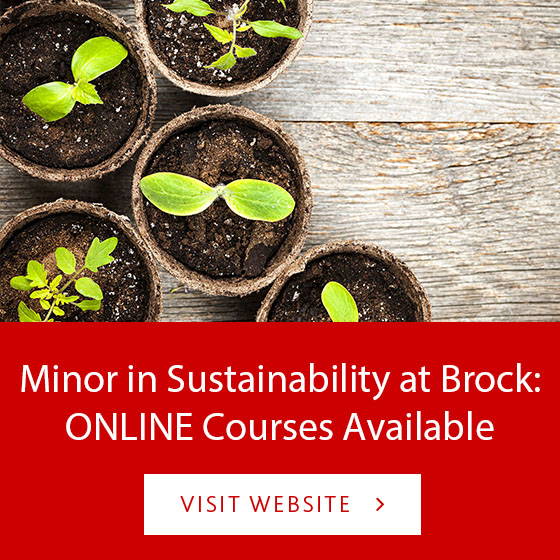
This Fall, students studying Environmental Sustainability at both the graduate and undergraduate level had multiple opportunities to learn in their community and engage with sustainability initiatives across the Niagara Region. Experiential education is an important aspect of both graduate and undergraduate-level education at Brock, and particularly within the ESRC. Amanda Smits, Centre Administrator at the ESRC, states “Providing experiential opportunities for students to get out into the field and create real-world connections with the content they are learning in the classroom is really foundational to our academic program offerings.”
Below we’ve outlined the different types of experiences our students have taken part in over the course of this semester.
SSAS 5P01: Foundations in Sustainability Science
This is a core course for students in their first year of the Master of Sustainability program, but often includes Masters students from other programs at Brock and PhD students in the Sustainability Science program. This term, students enrolled in the course participated in three experiential education excursions. Their first excursion took them on a tour of various areas of Brock’s campus to learn about the university’s commitment to low carbon energy. First, the students hiked on the Bruce Trail through the Niagara Escarpment Biosphere Network, both of which border Brock’s campus. They were then taken to Brock’s Central Utilities Building (CUB) where Mary Quintana, Director, Asset Management & Utilities, and Drew Cullen, Manager, District Energy provided the students with a tour of Brock’s District Energy System and the tunnels that support the delivery of low-carbon utilities across Brock’s main campus. To learn more about the District Energy Efficiency Project please visit here or check out this Youtube Video.
On their second excursion, the students learned about climate action in Niagara. They met with Beatrice Perna, Climate Change Specialist with the Niagara Region’s Corporate Strategy Services, and Alexandra Cotrufo, Climate Change Intern at Niagara Region and recent Master of Sustainability graduate. The students once again visited the Bruce Trail and utilized the fire pit area at Brock to have an informal conversation with both Beatrice and Alexandra about the climate change work being undertaken by Niagara Region and their career evolution. The students also got to learn more about the Niagara Climate Change Action Network, on whose steering committee Brock participates.
For their final course excursion, the students left Brock’s campus and were taken on a tour of ecological restoration sites that are managed by the Niagara Parks Commission. NPC’s Project Manager of Forest Health, Corey Burant, and Master of Sustainability student Sydney McIntyre led the students around the various sites and explained how stewardship and biodiversity preservation is being prioritized in each, including the Chippawa Grassland Restoration Project, the Ussher’s Creek Coastal Wetland Restoration Project, and the Gonder’s Flats Wetland Restoration Project.
SSAS 5V82: Nature Based Solutions in Sustainability
In another graduate-level course, students got to witness a unique form of invasive species management. The students traveled to Niagara Falls to visit one of Ontario Power Generation’s (OPG) properties to see how they are utilizing goats to manage the spread of invasive phragmites. Here they met with Nancy Laser, Environmental, Chemical and Safety Tech with OPG to tour the site and learn more about how the goats are helping to clear OPG lands surrounding hydro stations and other areas. Clearing these lands allow staff to safely obtain readings of water flow rates, water quality, and water level readings at their sites while managing the spread of these invasive species. Fascinated by this innovative project, the course instructor, Marilyne Carrey, noted that it is “through these experiential education opportunities that graduate students gain the essential knowledge and practical skills needed to cultivate a deeper understanding and enthusiasm for developing impactful solutions to complex environmental challenges. Dealing with invasive plant species demands innovative approaches, such as those being implemented by the OPG.”
You can learn more about the work being undertaken by OPG here.
ENSU 3P90: Contemporary Environmental Issues
ESRC graduate students weren’t the only ones to participate in experiential education this term, our undergraduate students also took part. This group of students took a trip out to Gonder’s Flats Wetland Restoration Project in late October 2023. There, they met up with Master of Sustainability student Sydney McIntyre, who introduced them to the iNaturalist app and demonstrated how Niagara Parks is encouraging members of the Niagara community to use the app to catalogue different plant and animal species in the region. The students used the app to participate in a mini bio-blitz, where they took photos and logged various species around Gonder’s Flats, which assists in growing NPC’s species database. The students then participated in a tree planting initiative in the area to increase biodiversity in the wetland.
Dr. Jessica Blythe reflected “We often hear from students that these experiential education opportunities are some of the most memorable experiences of their program. Being able to connect directly with people in the fields that many of our students go on to work in provides an unrivalled opportunities for learning and networking”.












































































